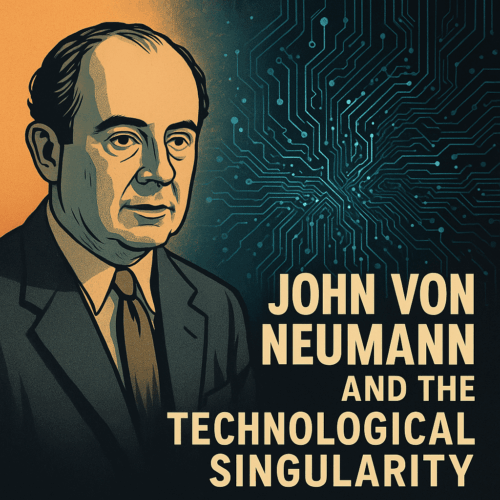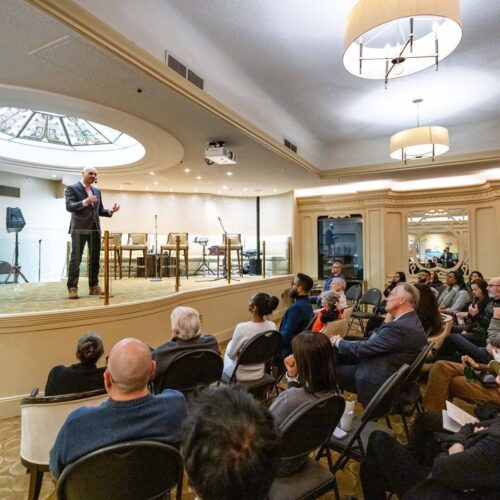It’s Future Day: Happy Tenth Millennium!
Steve Morris / Op Ed
Posted on: March 1, 2014 / Last Modified: March 1, 2014
 The Ancient Greeks had a word for the largest number that they could conceive of. It was the myriad and it meant literally ten thousand. Coincidentally, that’s roughly the age of human civilization. So today, on Future Day I’m celebrating civilization’s first myriad.
The Ancient Greeks had a word for the largest number that they could conceive of. It was the myriad and it meant literally ten thousand. Coincidentally, that’s roughly the age of human civilization. So today, on Future Day I’m celebrating civilization’s first myriad.
Ten thousand years ago was the beginning of the Neolithic period, sometimes called the Anthropocene period – the era in which humans would begin to exert a permanent and profound influence over their environment.
Prior to this, the fate of the planet was controlled by natural cycles of warming and cooling, by Ice Ages and by sudden catastrophic events like volcanoes, earthquakes and meteorites. Now, for the first time, the building of cities, the clearing of forests for agriculture and the rising human population would start to become significant factors influencing the biosphere.
We are genetically almost unchanged since that time, but our culture has been changing and growing at lightning speed.
Ten thousand years ago marked the invention of agriculture in Mesopotamia – probably the key invention that transformed our world. The world’s oldest surviving buildings also date from around this period. Copper smelting began around 7,500 years ago, closely followed by the invention of the wheel and the first examples of proto-writing. 6,000 years ago the horse was domesticated, and soon after the first city appeared at Eridu in Mesopotamia. 5,000 years ago the Bronze Age began, to be followed by writing and the rise of Classical civilization. From there it was a short 2,000 year period of rapid scientific, technological and economic progress to the present day.
Of course, that whirlwind tour of history and pre-history hides a lot. It’s only in the past 200 years that we moved from a predominantly agricultural rural-based society to an urban one. It’s only in the past half century that ordinary people, and women in particular, have become empowered to live their lives in relative freedom and prosperity. And it’s only in the past couple of decades that the developing world has started to catch up with the West.
Looking forward, what can we expect in the next ten millennia?
I’m not going to try to make specific, qualitative predictions. But what about a quantitative prediction of the total value of human culture? How can we put a figure on growth? Technological inventions? Scientific discoveries? Broader cultural and societal improvements? These are all hard to quantify. We could instead use economic growth as a catch-all measure of human progress, incorporating technological, cultural and other factors, as well as population growth.
In the past one thousand years, GDP has grown approximately 350-fold, which equates to an average sustained GDP growth of 0.6%. If growth continues at this rate, the economic increase of the past 10,000 years will take place again in the next 120 years.
This is a conservative estimate – in the past century, world economic growth has averaged closer to 3%. At this rate, the global economy will double in just 25 years!
The wealth that took our ancestors 10,000 years to build will be created again in a single generation. Imagine fast-forwarding all of the knowledge acquired from the building of the first city, to metal-working, to the industrial revolution and the computer and information revolutions and packing that growth into our own lifespan. That is what those of us living in the 21st century are experiencing right now.
Where will we be in another 10,000 years?
 I’m not even going to attempt an answer. I hope it will be clear from this discussion that we are developing so rapidly now that another 10,000 years could see changes that will transform our culture, our world and our very selves unrecognisably. But even that will be just a short blip in the 200,000 year history of Homo sapiens sapiens, the subspecies of Homo sapiens that includes all modern humans.
I’m not even going to attempt an answer. I hope it will be clear from this discussion that we are developing so rapidly now that another 10,000 years could see changes that will transform our culture, our world and our very selves unrecognisably. But even that will be just a short blip in the 200,000 year history of Homo sapiens sapiens, the subspecies of Homo sapiens that includes all modern humans.
In a sense we are still near the beginning of our great adventure in civilization. Like a child growing towards adulthood, we’ve learned a lot about ourselves and the tiny corner of the universe we live in. We’ve explored a little of the big wide world, but there’s a lot out there that we can’t even guess at. We’ve made a lot of mistakes and have stumbled and hurt ourselves, but we’re steadily learning how to do things better. In time, we’ll mature and won’t make so many mistakes. When we look back, in another myriad of years, we’ll be amazed at just how far we’ve come.
In the meantime, let’s remind ourselves how much we’ve grown already, and wonder at all the things we’ve achieved in our civilization’s short life.
About the Author:
 Steve Morris writes for consumer electronics site S21.com and blogs about science, technology and culture at Blog Blogger Bloggest.
Steve Morris writes for consumer electronics site S21.com and blogs about science, technology and culture at Blog Blogger Bloggest.








